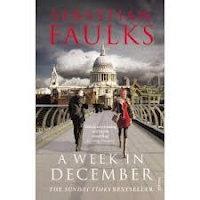 If you’re familiar with Ralph McTell then
you’ll know in 1969 he took us by the hand and led us through the streets of
If you’re familiar with Ralph McTell then
you’ll know in 1969 he took us by the hand and led us through the streets of
In 2006 Maeve Binchy took us under London London London
 This is the novel my book group was presented with
for March, as the self explanatory title states this book has us spending the
third week in December following the lives of seven characters (ahem), whose
lives are all connected by the central line on the
This is the novel my book group was presented with
for March, as the self explanatory title states this book has us spending the
third week in December following the lives of seven characters (ahem), whose
lives are all connected by the central line on the
Faulks may have been trying to copy the success
of Binchy’s book. What he ended up doing was producing a rather messy attempt.
How? Well, Binchy’s book, like her
previous compilation of short stories, ‘The
Lilac Bus’, set on a rural bus route in Ireland, had each of the characters
stories nicely rounded into a chapter each or as in the case of ‘Central Line, Victoria Line’, set around
a particular stop on the tube line. Faulks has his stories clumsily chopped and
intermingled all over the place as the
days progress so that just as you get into one story it jumps to another and
you have to remember what’s happening.
The blurb on the back, said the book follows
seven characters. Well each of these actually have four or five others who
interact regularly and distract from the story and get large chunks of chapters dedicated to them, a couple prime
examples are Sophie Topping and her husband Lance, a recently elected local MP
and rising political star. Their sole aim seems to be hosting a dinner party at
the end of the week at which four of the characters will attend along with a gaggle
of others, who just seem to exist as page fillers.
Then there’s the uneven allocation of space,
with lots of space given over to certain characters and not enough to others.
Veal’s story for example, takes up almost half the book and if Faulks had put
his mind to it, he could have got a full novel out of this character. While
Borowski the soccer play gets at most ten pages of story all the way through
the book, his story, like that of Veal’s son Finbar, rather limps through the
book with no real conclusion. The same goes for that of Hassan, the English
born Muslim kid being radicalised. Here again, is another ideal opportunity to
write a rather enthralling and taut full length thriller. But as the narrative leads
up to the bombing of a fictional London
hospital, (Which is being targeted for
no apparent reason, other than it is full of white people), where a number of
the other characters have found
themselves in the course of every day life, it whimpers out to nothing when
Hassan gets second thoughts.
The nicest story of the whole book is that of
the blossoming love affair between Jenni Fortune and Gabriel Northwood. Gabriel
is representing Transport For London, the company who run the underground. In a
case brought by the suicide victim’s family. we are led nicely through their
relationship over the course of the seven days which, in anyone’s book is a whirlwind
romance to say the least, then just as you get that funny warm feeling for the
two characters and happy that they are finding true love… the book ends,
leaving the reader hanging. What happens next? Do they live happily ever after?
This again is a theme through the book, with most of the stories, they stop
dead; with no epilogue as to what happens after midnight on the Saturday when
the dinner party ends… We never know whether Veal’s deal goes through…
This is what keeps the reader turning the
pages, the expectancy of what might happen. One classic technique used by Faulks
is that of a mysterious cyclist dressed in black with no lights on their bike
who speeds along the pavement forcing each of the characters to jump out of his
or her way. But again, this individual appears to have no role in the book
except to nearly run down all the characters.
These characters are here to be lampooned and
it came out at the discussion in the book group that the sole aim of this book
was for Faulks to “have a go” at these types of people. He seemingly hates
wealthy financial types who play risky games with our money to line their own
nests; book critics (Oh well, I’ll be in the next book, represented as an
online faceless blogger!) and cyclists
who speed around pavements with no lights on.
So all in all, you’re getting the picture that
I was not impressed by A Week in December.
This isn’t the first time I’ve read a Sebastian Faulks book. I read his 2008
James bond novel Devil May Care,
commissioned by the Ian Fleming Foundation to commemorate the writer’s 100th
birthday. I was rather disappointed, after
reading Fleming’s books and the follow-on series by John Gardner. Faulks’
attempt was a lack lustre affair with no memorable storyline and very little in
the way of gadgets or excitement, which Fleming and Gardner had delivered on
and which the film going public had grown up with over on the past 25 years.
So I’m not surprised by how this Faulks book turned
out. Take my advice-‘mind the gaps’ in the story-telling and miss this stop to
avoid the over crowded platform or if you haven’t done so already, change here
for Binchy’s Victoria Line, Central Line.



No comments:
Post a Comment